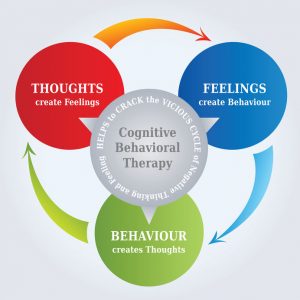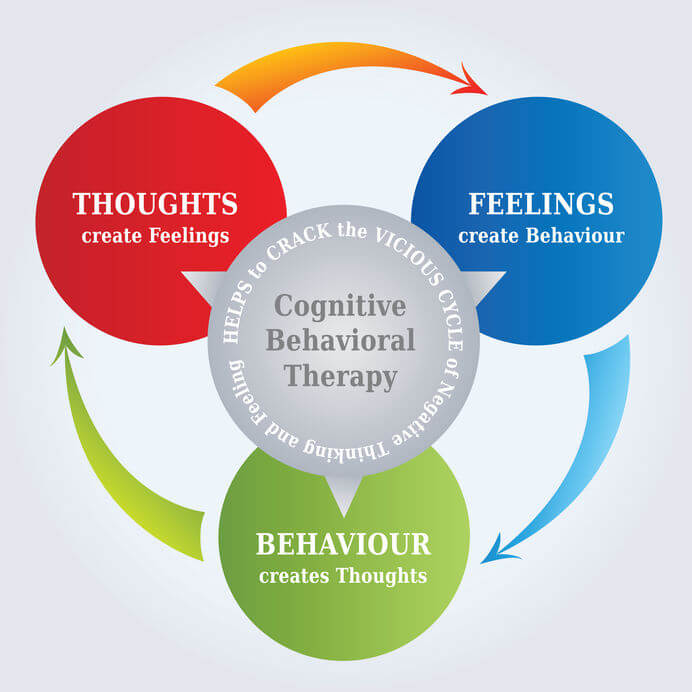
This article will give you a better idea of what Cognitive-Behavioural Therapy (CBT) is, who it’s for, how it works, an overview of the problems it helps with, and what you can expect from a session with us at Newcastle Psychologist & Counselling.
It’s important for you to feel comfortable and confident about the CBT therapist you choose, whether for yourself or a family member. At Newcastle Psychologist & Counselling, we work hard to provide the ideal support solution for each client.
In order to help you properly, we offer meetings in-person in one of our clinics in Jesmond and Gosforth, or online if you can’t come in (or live elsewhere). We also offer evening and weekend sessions too, so we fit in with your busy lifestyle, you can book online.
Understanding Cognitive-Behavioural Therapy (CBT)
Cognitive-Behavioural Therapy (CBT) is most often used to treat a variety of problems, including depression, anxiety, trauma, OCD and worry, but it can be used to help those with a range of physical and psychological difficulties including sleep problems (such as insomnia).
CBT is based on the concept that your thoughts, feelings, physical sensations and actions (“behaviours”) are interconnected, and those negative thoughts, feelings and behaviours can trap you in a vicious cycle or spiral.
When you start CBT, you’ll be working in a safe way to identify negative patterns and thoughts, then given the tools to change these unhelpful thoughts and behaviours and to deal with problems by breaking them down. We’re committed to supporting each client through to the right outcome.
In your first session, your CBT therapist will ask about what you’re currently going through and maybe some questions about your past or future worries. Even though it might be hard, it is helpful to be as open and honest as you can about your problems.
Who is Cognitive-Behavioural Therapy (CBT) For?
Cognitive-Behavioural Therapy (CBT) has been proven to be effective for a range of problems (including depression, anxiety, trauma, addiction, generalised anxiety disorder, worry and panic) in children and adults though it might be presented in different forms depending on the client. It’s also suitable for couples and families.
As well as having skilled Specialist CBT Therapists, Newcastle Psychologist & Counselling‘s Lead Psychologist, Dr Stuart Sadler (Chartered Clinical Psychologist), is also trained and experienced in a specialist form of Cognitive-Behavioural Therapy aimed to help improve people suffering from insomnia, nightmares, and early morning waking (Cognitive-Behavioural Therapy for Insomnia, CBT-I). This uses different methods and techniques from regular CBT and has been shown to have outstanding results even in people that have suffered from sleep problems for years.
How does Cognitive-Behavioural Therapy (CBT) Work?
Cognitive Behavioural Therapy (CBT) is designed to primarily help you break the cycle of negativity. Patterns can be established from a young age and depending on how you respond to things, you may find you develop an automatic, self-critical inner voice which can have a serious impact on your wellbeing.
If you experience situations negatively, this can lead to negative emotions and impact on your behaviour. You then fall into a cycle of constant criticism and feelings of inadequacy. CBT will help you break that cycle.
At Newcastle Psychologist & Counselling, we support you to resolve issues that are holding you back. CBT is very much a collaborative process, and your psychologist is dedicated to enabling you to make decisions yourself, rather than making them for you.
Our team often have a short conversation with clients before they come for their first session, so you’ll understand the benefits of Cognitive-Behavioural Therapy and to ensure that they are the best therapist to help. If there’s anything you’re not sure of, or if you’d like more details on anything discussed in this article, one of us will be pleased to answer your questions.
How Does Cognitive-Behavioural Therapy Help?
Cognitive-Behavioural Therapy focuses primarily on the here and now though may also look at what’s happened in your past and how this may be impacting your current situation. It focuses on helping you to find everyday, practical solutions to feel more positive and able to deal with challenges.
The National Institute for Health and Clinical Excellence (NICE), the independent body who review the evidence and provide guidelines for physical and psychological treatments have found that CBT is an effective way to treat mental and physical health issues (including pain). Cognitive-Behavioural Therapy at Newcastle Psychologist & Counselling is delivered by fully-qualified psychologists and Specialist CBT Therapists, so you can be assured that you’ll be properly supported.
Cognitive-Behavioural Therapy is proven to help with:
- Anxiety
- Depression
- Bi-polar disorder
- Schizophrenia
- Chronic pain
- OCD
- Sleep disorders (as CBT-I, provided by our Specialist Sleep Therapist, Dr Stuart Sadler)
- Trauma
- Anger management
It can also help those with chronic illnesses to manage their mindset and feelings about their health. It doesn’t treat the physical symptoms but enables you to manage them better and help you focus on living the best life you can. It’s worth noting that CBT can be used along with medication prescribed by a doctor, or on its own.
The Cognitive Behavioural Therapy Process
A CBT session lasts approximately 50 minutes, and it involves working with a therapist either weekly or fortnightly. Your CBT Therapist will tailor your course to help you reach your personal goals and plan the sessions with you.
During the session, your therapist will help you to work through your thoughts and behaviours and support you to find ways to change these, so you get the best results possible from CBT.
You may also be given ‘homework’ which takes the content of the session out into the real world so that you can start to make changes in your everyday life.
When you next meet with your therapist, you’ll be able to update them on your progress or any struggles you had, and then you can work together to refine the strategies until they suit you best.
Cognitive behavioural therapy (CBT) gives you the tools you need to introduce new ways of approaching the challenges we all face in life and encourages you to think differently.
For Further Information
If you are suffering from any of the above problems and feel that Cognitive-Behavioural Therapy (CBT) might help, contact us today at Newcastle Psychologist & Counselling using the box below.




